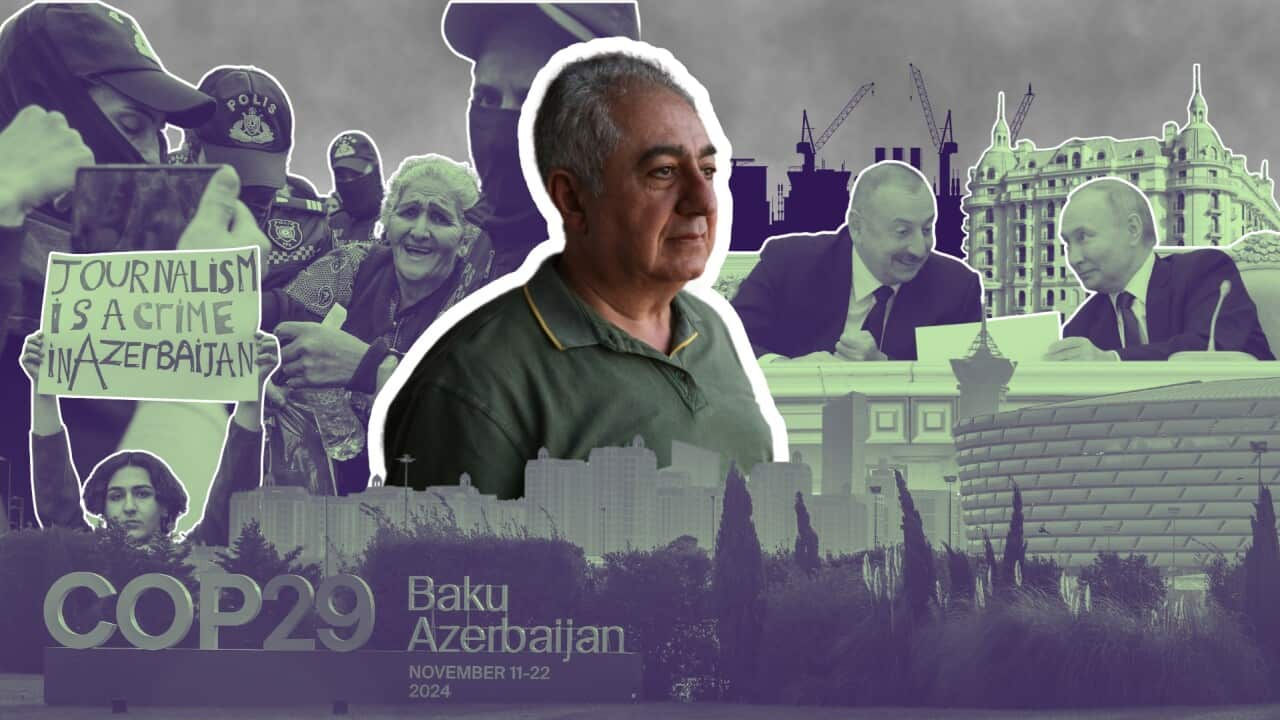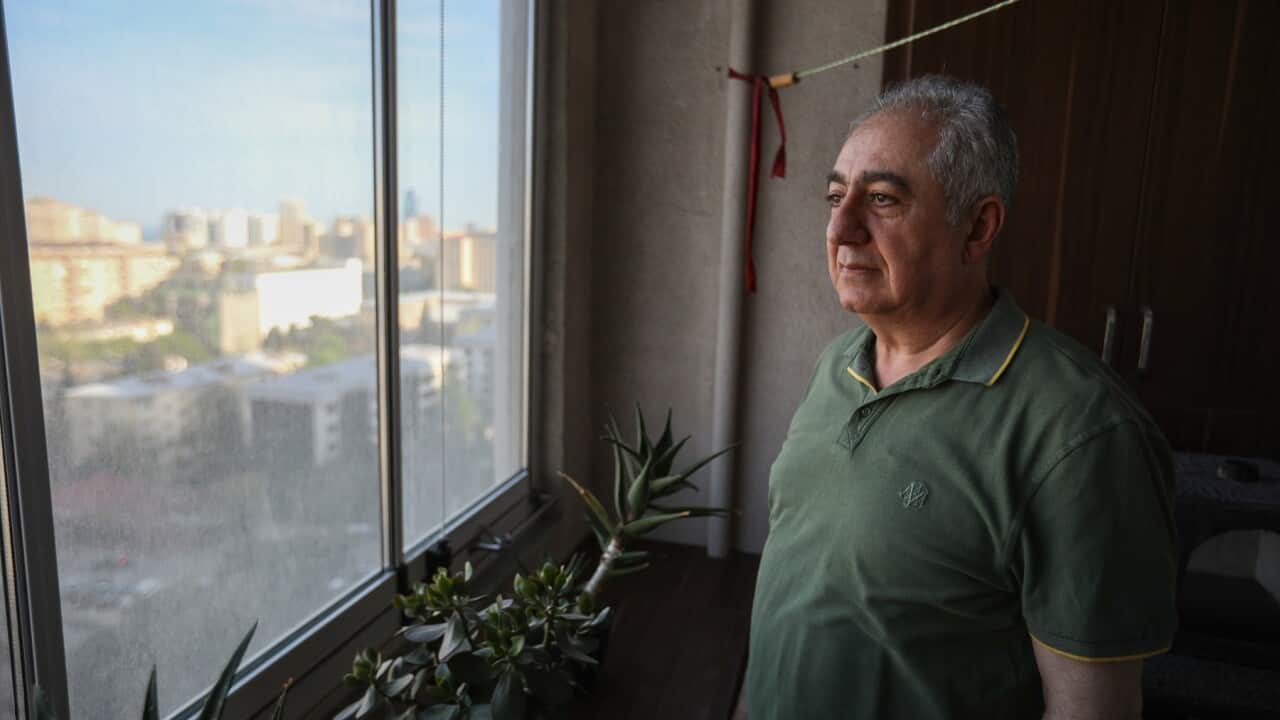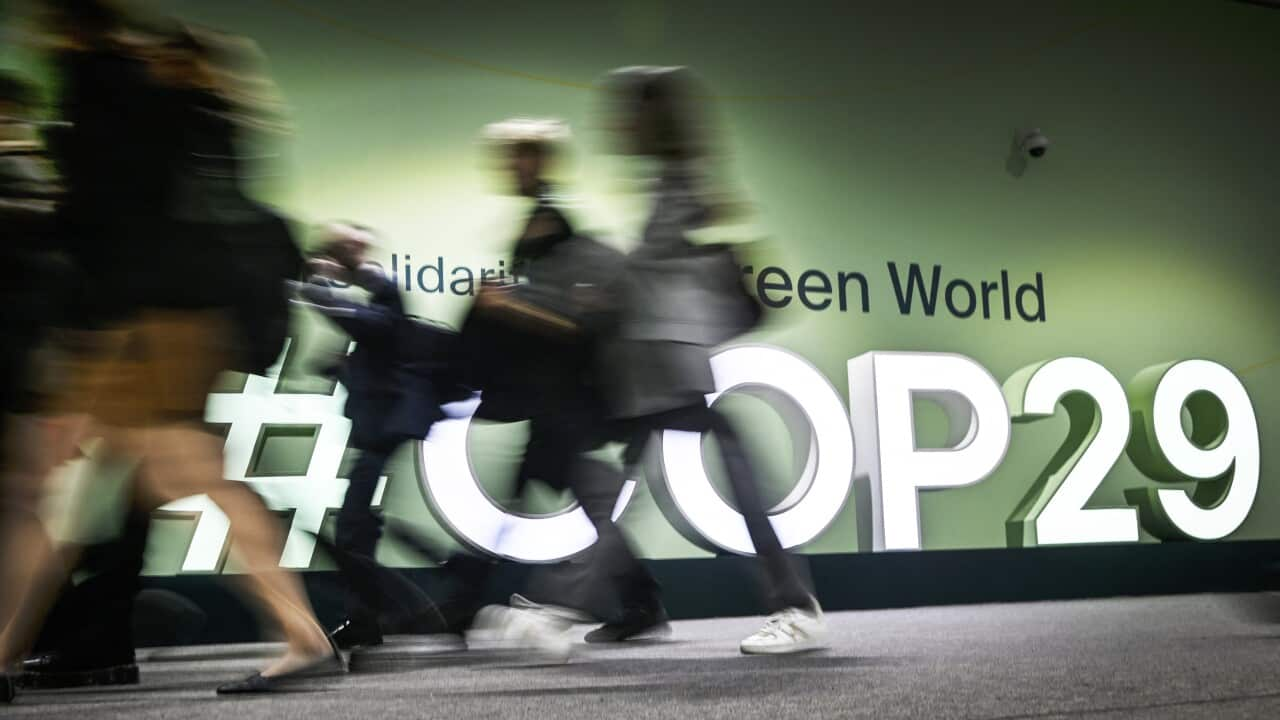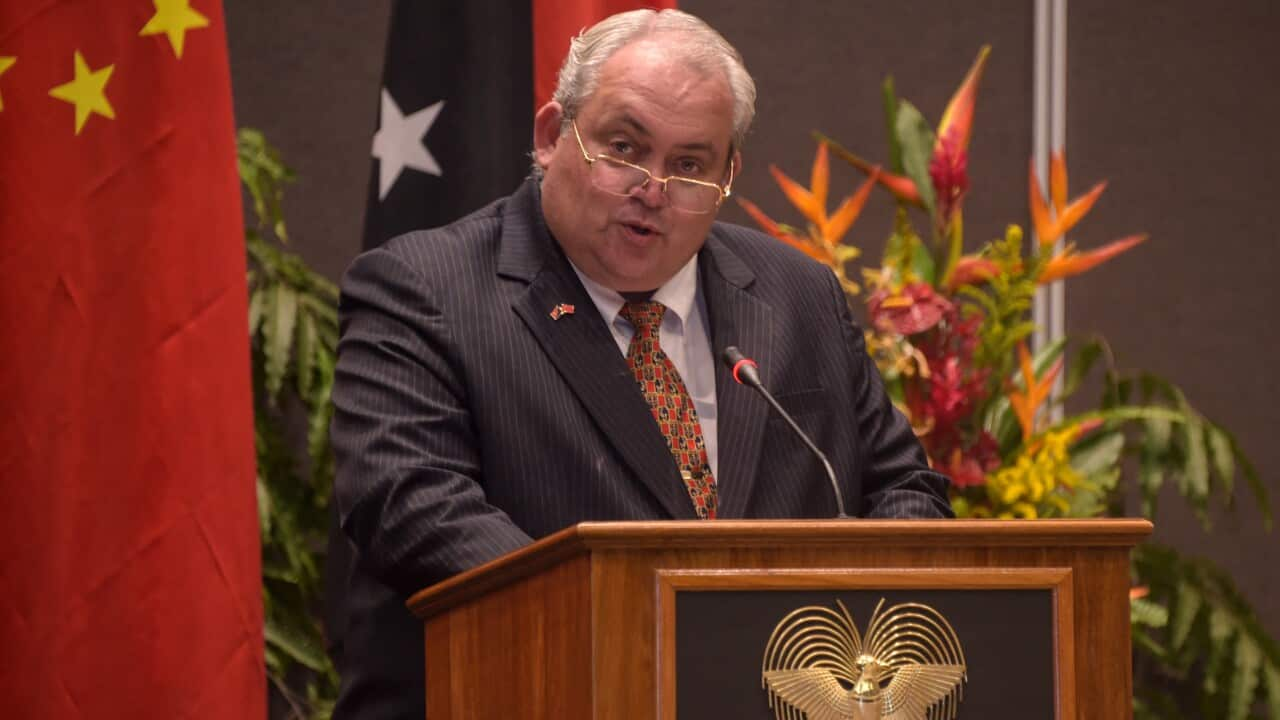In July last year, Azerbaijani academic Gubad Ibadoghlu had a life-altering experience.
The 53-year-old economics professor was travelling with his wife Irada Bayramova to visit his sick mother in the capital Baku when they were violently ambushed.
The couple's car was rammed from both sides by four unmarked vehicles, bringing them to a stop before around 20 plain-clothed police officers emerged and forced the pair into separate vehicles.
Baryamova was beaten and detained by the officers for several hours before being released.

The Narimanov District Court in Azerbaijan transferred Gubad Ibadoglu (left, with his mother) to house arrest after international pressure. Credit: Aziz Karimov/Getty Images
As a result, Baryamova has lost 30 per cent of her brain function in that area and can no longer stabilise herself when walking.
Ibadoghlu was also badly beaten by the officers and suffered spinal cord injury for which he was denied medical treatment.
To an outsider, Ibadoghlu's attack and subsequent arrest may seem arbitrary — it's anything but.
False accusations
The London School of Economics professor has spent his 25-year career researching and exposing corruption in Azerbaijan's fossil fuel industry, a highly lucrative sector for the small authoritarian petrostate.
Baku is the site of the world's first-ever oil fields, established in 1846, and this week has become host to the United Nations' .
Azerbaijan was appointed host by the UN in December 2023 after Russia vetoed the vast majority of other Eastern European nations — the group from which the host country was scheduled to be drawn — on the basis of their condemnation of Russia's invasion of Ukraine.
With only Armenia and Azerbaijan remaining in contention, the former was ultimately selected after Russia brokered a deal between the two nations, which have been embroiled in a decades-long conflict.

COP29 host Azerbaijan is under scrutiny. Credit: Aziz Karimov/Getty Images
At the opening of the conference on Tuesday, Azerbaijan's authoritarian President Ilham Aliyev addressed delegates, saying oil and gas were a "gift from God".
His government has also come under fire for trying to conceal plans to expand fossil fuel production , including crackdowns on anti-corruption advocates such as Ibadoghlu.
The prominent academic and critic of the country's oil and gas industry has been accused by authorities of producing, acquiring, or selling counterfeit money as part of a larger organisation.
Most observers view Ibadoghlu's charges as politically fabricated to silence his criticisms of the regime.
Following his arrest in July 2023, Ibadoghlu was imprisoned at an unknown detention facility in Azerbaijan, along with hundreds of other political prisoners. He was held there for nearly 500 days without trial and denied access to medical assistance before being transferred to house arrest in April.
He suffers from multiple health conditions, including diabetes and a swollen heart aorta, which if left untreated could be life-threatening.
Speaking from Sweden, members of his family told SBS News Ibadoghlu is still being denied access to the surgery he needs.
Zhala Baryamova, a human rights lawyer and one of Ibadoghlu's three children, says their family "are scared for his [Ibadoghlu's] life".
"[We] are scared that at this rate we will never be able to see him alive.
I am not only losing a father but my best friend and hero.
Crackdown on civil society and media
Before his arrest, Ibadoghlu was working on research to expose how Azerbaijan has reportedly been , bypassing sanctions imposed after Russia's invasion of Ukraine in 2022.

Russian President Vladimir Putin (left) met Ilham Aliyev (right) in August 2024 to discuss the joint production of oil tankers between Russia and Azerbaijan. Source: AFP / Vyacheslav Prokofyev / Getty Images
Zhala Baryamova says their family has also been targeted from abroad.
"My personal pictures [have been shared] on the internet [and] I was being followed in Stockholm," Baryamova says.
Every week, there are many videos and news about our family. [They spread] smear campaigns and target us.
"My little brother Emin Bayramli was sharing a room with other American students in New Jersey, US. His room, and only his room was destroyed ... and this summer his address was doxed, and in both cases, the FBI had to secure him before starting an investigation."
As COP29 gets underway this week, authorities in the Central Asian country have intensified their crackdown on government opposition and independent media.
A by corruption watchdog Transparency International labels the lack of robust anti-corruption measures in Azerbaijan as a "serious oversight" in the planning of COP29, which threatens the integrity of the conference.
The report highlights risks posed by fossil fuel companies and corrupt leaders who may seek to use the conference for their own enrichment.

Police officers detain an activist at a rally by the Popular Front party in Baku in 2022. A total of 177 activists were detained before and during the action. Credit: Aziz Karimov/Getty Images
"[The crackdown] impacts democratic discourse and the right to protest," says Moore.
"It also threatens human rights advocacy; it limits accountability and people speaking out and also promotes a culture of impunity, [so] that authorities and government can arrest people without any consequences and often without proper trials or proper judicial processes."

Feminist activists protested in Baku earlier this year, demanding the release of journalists Sevinj Vagifgizi, Nargiz Absalamova and Elnara Gasimova from investigative media outlet Abzas Media. Credit: Aziz Karimov/Getty Images
A report released in September by human rights project the Anar Mammadli Campaign puts the number of known political prisoners in Azerbaijan at 319, adding that 226 of those have been arrested within the last year and a half.
An authoritarian family
Azerbaijan ranks 154 out of the 180 countries on Transparency International's Corruption Perceptions Index, making it the most authoritarian state to host the climate summit to date.
President Ilham Aliyev has maintained a strong grip on the country since taking over from his father, Heydar Aliyev, in 2003.
His father was installed as president in 1993 following a military coup, which brought the country's brief post-Soviet democratic period after 1991 to an end.
Aliyev established authoritarian rule during his decade in power — a leadership style continued by his son and successor Ilham Aliyev.

Soldiers beat a supporter of the opposing Musavat party during riots in Baku following the 2003 election, which was widely expected to result in a transfer of power from father to son. Credit: Oleg Nikishin/Getty Images
The president's power extends to his immediate family also: His wife, Mehriban Aliyeva, is the Azerbaijain's vice president.
Aliyev's son, Heydar Aliyev Jr., owned nine waterfront mansions overseas by the time he was 12 years old.
His daughters Leyla and Arzu Aliyeva own Azerfon, one of the largest telecommunications companies in Azerbaijan. They also own PASHA Holdings, a major conglomerate that built the Four Seasons hotel in Azerbaijan and receives substantial government contracts across different sectors.

Azerbaijani President Ilham Aliyev, his wife Mehriban Aliyeva and his son Haydar Aliyev attend the official opening ceremony of the 2016 Formula One Grand Prix of Europe in Baku. Source: Anadolu / Anadolu/Getty Images
The Aliyev sisters also have a majority stake in a conglomerate that owns GILTEX, COP29's textile partner and the president's youngest daughter, Arzu, is a joint owner of Silk Way Bank — the financial arm of the group that owns Silk Way West Airlines, which is COP29's 'Global Air Cargo Partner'.
As well as the official partners, the COP29 organising committee is also heavily staffed by members of Aliyev's New Azerbaijan Party as well as the state oil company SOCAR. The president of the COP29 committee, Mukhtar Babayev, has worked in various roles at SOCAR since the 90s.
The influence of the Aliyev family and its political allies on the set-up of COP29 has cast aspersions on the government's motives to host the summit, which is primarily aimed at reviewing progress on limiting and mitigating climate change.
Greenwashing
This year, the Climate Action Tracker ranked Azerbaijan's climate action as "critically insufficient".
The independent scientific project aims to track and measure progress against climate targets set out in the and says Azerbaijan is among a "tiny group of countries that have actually weakened its climate targets".
Despite signalling good, green intentions ahead of the climate summit, the Azerbaijani government has already signed contracts and made pledges to increase its production and export of fossil fuels.
Associate director of Human Rights Watch Europe and Central Asia Division Giorgi Gogia told SBS News that Azerbaijan often uses major events, not only as a major revenue source for the ruling family but to cover up its "abysmal" rights and climate record.
He points to Azerbaijans' attempt to "whitewash" its international image by hosting Eurovision in 2012, which Gogia says backfired, as international journalists covering the event witnessed the brutality of police and crackdown on protests firsthand.
In 2015, Azerbaijan hosted the first-ever European Games, but this time it did not make the same mistake. In the lead-up to the event, scores of arrests were made citing fake charges related to money laundering and treason — in a similar vein to the crackdown ahead of COP29.
A recent documents the cases of 33 recent arrests of human rights defenders, journalists, and independent civic activists in Azerbaijan. Among them, 20 individuals have been charged with smuggling money into the country.
What about foreign press?
Human Rights Watch recently obtained a copy of the Host Country Agreement signed by Azerbaijan and the UN Framework Convention on Climate Change (UNFCCC) covering the conference. A spokesperson for the organisation says it contains language that "is replete with significant shortcomings and ambiguities on the protections for participants' rights".

Human Rights Watch says: "There is no clarity in the agreement about what actions could constitute 'interference' with Azerbaijan’s 'internal affairs' and whether Azerbaijan’s laws apply in the UN-run conference zone." Credit: SBS News
In a message to those attending, Baryamova says they hope others will speak out about what Azerbaijanis cannot.
"We are part of the world, we have [the] right to discuss all these matters like all of you," they said in the message.
"Please, we cannot do it now, but help us to fight for climate. For that, we need to be free, and my dad needs freedom.
"Be our voice, support us, help us."












